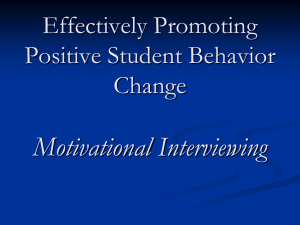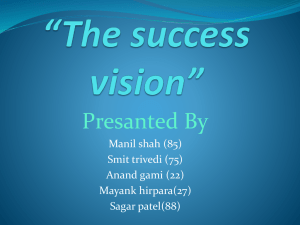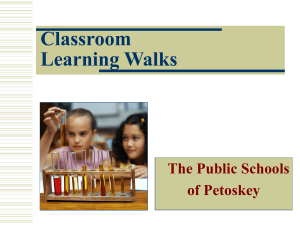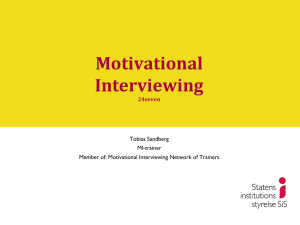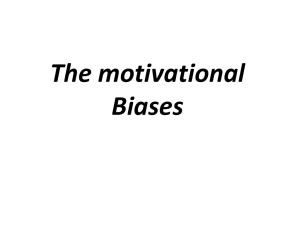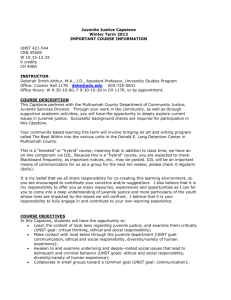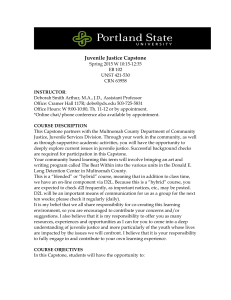Motivational Interviewing
advertisement
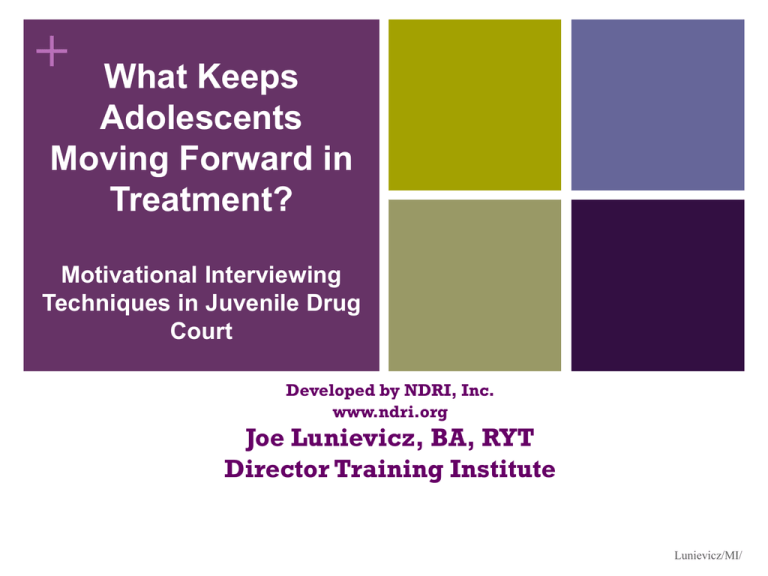
+ What Keeps Adolescents Moving Forward in Treatment? Motivational Interviewing Techniques in Juvenile Drug Court Developed by NDRI, Inc. www.ndri.org Joe Lunievicz, BA, RYT Director Training Institute Lunievicz/MI/ + Dyads: What Motivated You? What was most important to you: • When you were 13? • When you were 16? • When you were 19? Lunievicz/MI/ 2 + What Motivates your participants to move towards graduation? Lunievicz/MI 3 + 4 Important Considerations Adolescence Autonomy The is about identity. issues are powerful. adolescent brain is still developing. Adolescent culture and values are different than adult culture and values. Lunievicz/MI/ + 5 Why not just change? Keep in mind the family dynamics adolescents go home to: Do their parents use? Were they born addicted? Are they safe? Have they witnessed the unimaginable? Are there co-occuring mental health issues? Are there learning disabilities? How early did they start using? Lunievicz/MI/ + 6 Motivational Interviewing A directive, client-centered counseling style for eliciting behavior change by helping clients to explore and resolve ambivalence. It is a style of helping that uses a set of specific strategies. Lunievicz/MI/ + 7 Motivational Interviewing (Cont.) Motivation- or presumed lack of it- is not viewed as a personality problem or character trait, but as a state of readiness for change that can be influenced by a helping relationship. Rollnick & Miller, 1995 Lunievicz/MI/ + MI Basic Principles Lunievicz/MI/ Expressing Empathy Developing Discrepancy Rolling with Resistance Supporting Self-Efficacy 8 + 9 Why use MI in Drug Court? Better More Engagement Information Better Assessments More Relevant Recommendations More Successful Outcomes Lunievicz/MI/ + 10 “You don’t understand.” “You won’t understand.” - Anonymous Adolescent Lunievicz/MI/ + 11 Seek first to understand, then to be understood. -Stephen R. Covey 7 Habits for Highly Effective People Lunievicz/MI/ + 12 MI Strategies - OARS Open Ended questions Affirm Reflection Summarize Lunievicz/MI/ + 13 Impact of Communication Lunievicz/MI/ + 14 Open Ended Questions Who, what, where, when Tell me about… How did you… Redirect: Now Lunievicz/MI/ tell me about… + 15 Open-ended Examples: What worries you about your current situation? What difficulties have you had with your drug use? What do you think will happen if you don’t change? How has your anger interfered with your life? What Lunievicz/MI/ would your life be like 5 years from now? Practice: + Open-ended Questions Interview your partner by asking only open ended questions. Buzzer sounds whenever a closed ended question is asked. Lunievicz/MI/ 16 + 17 Affirm (but don’t flatter) Strengths based technique Verbally supports or validates a participant’s thoughts, emotions, or actions Demonstrates: Appreciation, Understanding, Support When Lunievicz/MI/ you see a strength, notice it + 18 Affirmation Example: 1. Participant arrives on time for his case management appointment. “You’re punctual. That will be a big help in this program.” 2. Participant: “I don’t want to do anything more than I need to. I just want to finish the program and get on with my life.” “Determination is a good characteristic to have in treatment. It will help to keep you focused.” Lunievicz/MI/ + Practice: Affirming Read the statement to your partner and your partner must respond with a strength’s based affirmation. Lunievicz/MI/ 19 + Reflective Listening Rationale Conveys willingness to try to understand Serves as a perception check Clarifies feelings Leads to more exploration Demonstrates empathy Lunievicz/MI/ 20 Common Errors Not listening closely Limited feeling vocabulary Monotone vocal qualities Premature focus on problem solving + 21 Reflection Expressing Empathy: “So, what I hear you saying is…” Reflecting Conflict: “On the one hand…but on the other hand…” “So what you’re saying is…but you are not able to…” Rolling with resistance: “You don’t have to do anything you don’t want to.” Lunievicz/MI/ + Practice: 1. 2. 3. 22 Reflection Paraphrase Reflect conflict Roll with resistance Lunievicz/MI/ + 23 Summarizing The Let set-up statement me see if I understand correctly… Reflection, Reflection, Reflection Open What ended Question did I miss? What other concerns do you have? Lunievicz/MI/ + Practice: Summarize • Let me see if I understand correctly… • • Reflection Reflection Reflection • What did I miss? • Lunievicz/MI/ 24 + 25 Questioning Skills Effective vs. Ineffective Questions Ineffective Too many questions Accusatory questions: Why? Multiple questions Explanatory questions Closed questions Lunievicz/MI + Questioning Skills Effective vs. Ineffective Questions Effective Have specific objectives in mind State background for question Use language of the client Check out whether client is understanding Ask openly: Who, What, When, Where & How Use open-ended questions Paraphrase; Reflect; Summarize Lunievicz/MI/ 26 + 27 Resources: EBPs that Address Adolescents Behavior Therapy (BT) Cognitive-Behavioral Therapy (CBT) Motivational Interviewing (MI) Motivational Enhancement Therapy/Cognitive Behavioral Therapy (MET/CBT Relapse Prevention Therapy (RPT) Adolescent Community Reinforcement Approach (A-CRA) Seeking Safety (SS) National Registry of Evidence-based Programs and Practices, SAMHSA Lunievicz/MI/ + 28 Resources: EBTs that Address Familial Issues Multisystemic Therapy (MST) Addresses COD issues also Brief Strategic Family Therapy (BSFT) Functional Family Therapy (FFT) Family Behavior Therapy (FBT) Addresses COD issues also From: Evidence-Based Practice Recommendations for Juvenile Drug Courts by the National Center for Mental Health and Juvenile Justice in collaboration with the Louisiana Supreme Court Drug Court Office - 2009 Lunievicz/MI/ + 29 Resources: EBTs that Address CODs Trauma Focused Cognitive Behavioral Therapy ( Motivational Enhancement Treatment (MET, CBTS) Individual, outpatient modality Individual and Group sessions Continuous, Comprehensive, Integrated System of Care Nodel (CCISC) A set of practice guidelines for dual diagnosis treatment From: Evidence-Based Practice Recommendations for Juvenile Drug Courts by the National Center for Mental Health and Juvenile Justice in collaboration with the Louisiana Supreme Court Drug Court Office - 2009 Lunievicz/MI/

